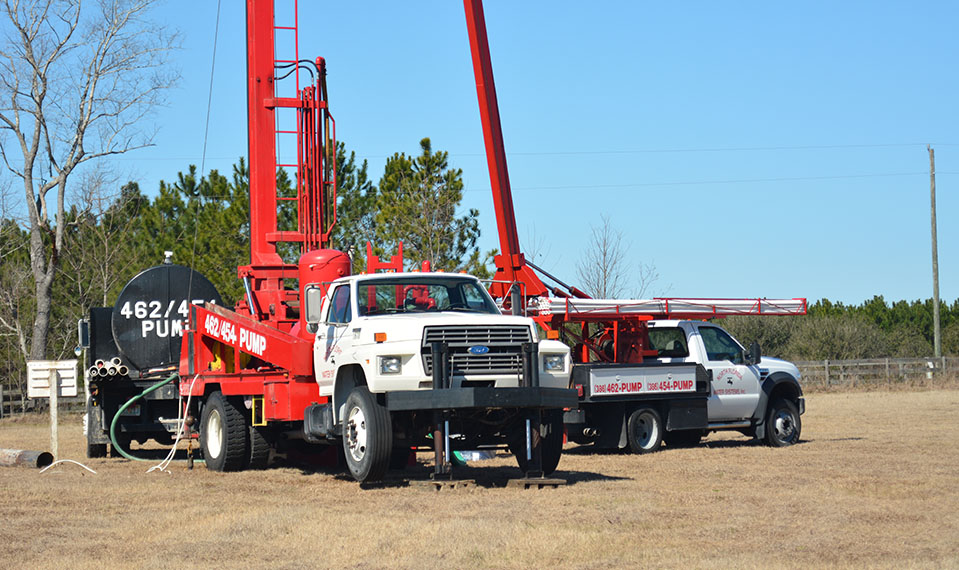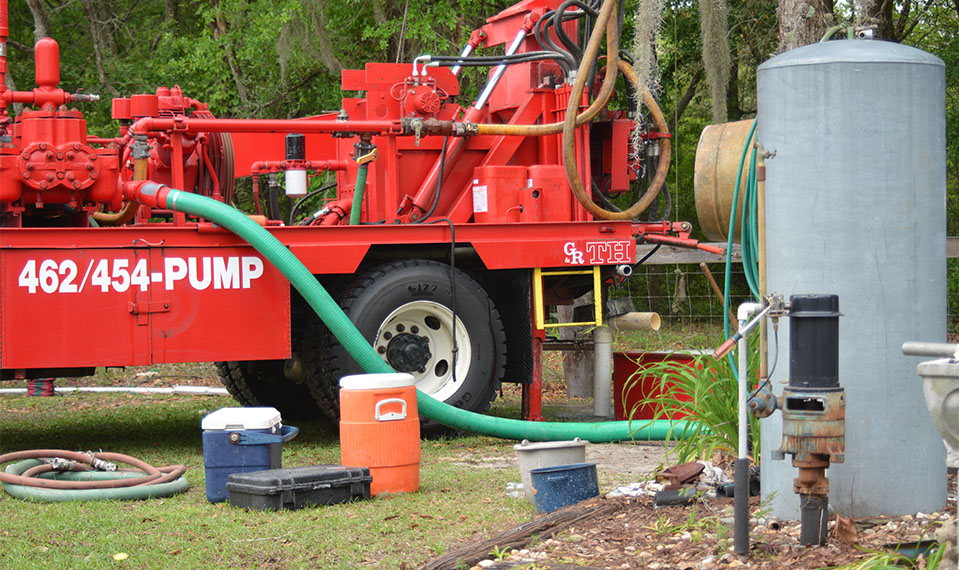Water Well Drilling & Pump Installations
North Florida Water Systems Inc Is The Premier Water Well Drilling Company In Florida
From drilling new wells to upgrading outdated ones, North Florida Water Systems Inc is your one-stop company for all new well and pump installations in Alachua, Chiefland, Gainesville, Lake City, Newberry, Trenton, and High Springs. Everything about how we drill is innovative and top of the line. We use a modern rotary drilling rig, rust-resistant PVC well casings, and two-wire well pumps that run reliably during Florida’s rainy season. Our drilling company is committed to providing you with the best water quality available. We install home water treatments, and our owner, Robert L. McMillan, Sr., and his son Robert Jr. oversee the drilling of every new well to ensure it meets our high standards.

Benefits Of Water Wells
A quality well is a valuable asset on your property. If you live outside the service area of a municipal water supply, a well is, literally, a lifeline. When constructed correctly, your well will furnish your family, landscape, and pets or livestock with clean, crisp, and refreshing water for years to come. And when you move, having that functioning well raises your property’s appeal. The cost of installing a well in Florida varies based on the depth of the aquifer and whether you need a hand pump or deep well pump installation. However, when you consider the convenience, taste, and health benefits of clean water, the investment in a new well essentially pays for itself.
Why Choose Our Drilling Company
In the early days, well drilling companies in Florida drilled by driving a steel casing in the ground. Many contractors still use this method, but there’s one problem: steel rusts! No matter how pure is your aquifer, if the well casing rusts and has holes cut in it, your water is at risk for contamination. Common water quality problems in Florida include turbidity (suspended sand or sediment), hydrogen sulfide (organic decay and bacteria), and acidity (corrosion). Over the years, we have seen good well water turned bad because of incorrect well system installations. That’s why we ensure our well construction methods are superior to our competitors’.
Our Well Installation Process
Getting your new well installed starts with making a phone call to North Florida Water Systems Inc We have convenient locations throughout North Central Florida, and if you’re not sure which is nearest to you, feel free to contact the main office for our drilling company in Gainesville for assistance. Our well system installations involve four stages: permitting, choosing a well location, well construction, and pump installation.

Permitting
New wells require a permit from the appropriate water management district. We’ll apply for the well permit for you. The information we’ll need includes your:
- Name
- Phone number
- Address (mailing and physical)
- Legal description (section, township, and range)
- Parcel number
- Driving directions
Once we receive this information by email, fax, or over the phone, we’ll add you to our drilling schedule. Then on the day the well is to be drilled, we’ll meet you at your property to endorse the contract and determine the proper site for the well.
Well Location
Making a choice about where to drill a new well takes several types of expertise. First, the well site must be far enough away from utilities, structures, and potential sources of contamination to satisfy the minimum separation distance required by Florida law. But avoiding potential risks, such as septic systems and buried gas or power lines, is only the beginning. The well’s location should also make retrieving water convenient and account for the appearance of the property as well as future construction plans.
Well Construction
How a well gets installed is just as important as where it’s placed. First, we use mud rotary drilling to bore an 8 ½-inch diameter hole down to the aquifer. Next, we set in a 4-inch diameter PVC casing that provides connects the groundwater with the surface. Lastly, we pour Bentonite grout, a natural, chemical-free mixture of clay and water, around the casing to secure it in place and prevent water leaks or well contamination.
Pumping System
The final step is well pump installation. A pump builds pressure inside the casing to cause groundwater to reach the surface. The suction required depends on the well’s depth. At North Florida Water Systems Inc, we use two-wire pumps exclusively because they’re dependable and hold up to lightning storms without electrical shorts. We also provide preventative maintenance and pump repair services.
Are you ready to get started drilling your new well? Contact us to begin the well permitting process today!
Water Well FAQs
Why Do I Need A Water Well?
If you live outside the city water supply, a well is the only source of clean, safe water. It’s also a valuable asset for your property and a smart, long-term investment that saves time, money, and stress.
What’s The Process For Installing A Well?
We have a four-step installation process for a new well: obtaining a permit, deciding on well location, constructing the well, and installing a well pump.
Where Should A Well Be Installed?
The well has to be installed far enough from sources of contamination — utilities, septic tanks, etc. A good rule of thumb is a distance of 50 feet between the well and these different sources. If there are construction plans for the future, the location should accommodate those as well.
How Much Room Is Required To Drill A Well?
The typical size of a well is between 6–8 inches in diameter, but this can vary based on surrounding geology, water yield, and type of equipment.
Can You Drill All Year Long?
Technically, drilling is possible all year, but it’s difficult during the winter months (January and February) as colder temperatures are hard on the equipment.
How Often Does A Well Need Maintenance?
Your well should be inspected annually by a professional for water quality issues or if you experience any of the following:
- Loss in water pressure
- Air spurts in the water
- Higher electric bill than expected
- Change in odor or appearance in the water
- Strange noises or clicking sounds coming from the system
What Type Of Well Is Installed?
In North Florida, Floridan aquifer wells, also referred to as artesian wells, are typically installed. Their depths range from 250 feet to 1,000 feet, depending on the location of the well and the intended use.
I Have No Running Water. What Should I Do?
This is often just a blown fuse or tripped breaker, which can be fixed on-the-spot. If the cause of no running water isn’t electrical, call well repair specialists.
If I Have Access To City Water, Can I Drill A Well?
Yes! Even if you already have access to a municipal water supply, you can still install a private well.
How Long Does It Take To Drill A Well?
Depending on drilling conditions, well installation can take 1–2 days.
How Do I Know My Water Is Safe To Drink?
At North Florida Water Systems Inc, we use Bentonite grout around the casing to prevent water contamination and to ensure safe drinking water. With that said, it’s recommended to test your water once a year for bacteria due to changing groundwater flow and other conditions that could affect the quality of your water.
What Causes High/Low Water Pressure?
There are a few reasons for the well not working as it should. Wells can “go dry,” meaning that water levels have dropped below pump intake. This could be due to a local power failure, an inadequate filter, or a lowering of the water table. All of this means the well may need to be dug a little deeper. Never make repairs on a well yourself; contact well drilling professionals at North Florida Water Systems Inc if you’re having water pressure issues.
If you notice any of these issues with your water or well, call North Florida Water Systems Inc right away to schedule a well inspection.